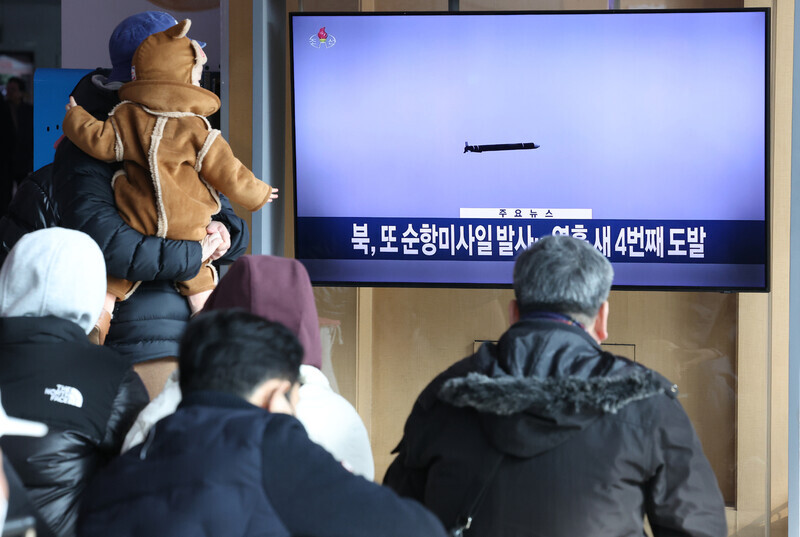hankyoreh
Links to other country sites 다른 나라 사이트 링크
[Column] The death knell of Korean ethnonationalism


By Kim Yeon-chul, former minister of unification and current professor at Inje University
South and North Korea have one bloodline, one language, one history and one culture — thus spoke North Korean leader Kim Jong-un during the inter-Korean summit in April 2018. But in a recent speech before the Supreme People’s Assembly, he defined inter-Korean relations as “the relations between two states hostile to each other and the relations between two belligerent states.”
While Kim’s change of attitude reflects the deterioration of inter-Korean relations, that’s not the whole story. The fact is that the nationalist approach has long been defunct. What we’ve witnessed is the last glimmer of sunshine winking out at dusk.
North Korea has two concepts of the Korean nation. The first was expressed in terms of “great national unity” in the South-North Joint Communique of July 4, 1972, “the joint efforts of the Korean people” in the South-North Joint Declaration of June 15, 2000, and “one nation” in the inter-Korean summit in 2018.
The second concept is not the Korean nation in its entirety, but rather the North Korean nation. The ideas of the “nation of Kim Il-sung” and the “Korean nation first principle” during the rule of Kim Jong-il were crafted to legitimize the North Korean ideology, system and leadership. The “patriotism of Kim Jong-il” under the current rule of Kim Jong-un is based on the same concept of the “nation of Kim Il-sung.”
The North Korean narrative about “the joint efforts of the Korean people” surfaced when inter-Korean relations were positive. That didn’t last very long. There was a much longer period when the North Korean leadership stressed “the North Korean nation” as an internal narrative of regime legitimacy.
When Kim Jong-un stressed the “principle of our state first” in January 2019, he was not making a transition from “nation” to “state.” Rather, he was scrapping the first concept of the nation (the one grounded in the reunification narrative) and replacing the second concept of the nation (the “North Korea nation”) with the concept of the “state.”
Inter-Korean relations following the division of the Korean Peninsula have been far from ethnonationalistic. Indeed, they have always been influenced by the world order because of the internationalization of the Korean question.
All five of the inter-Korean summits held to date, without a single exception, have been made possible by a thaw in Pyongyang-Washington relations, smoothing the way for trilateral relations with Seoul. That’s because outstanding issues cannot be resolved through inter-Korean relations alone. “The joint efforts of the Korean people” was merely a slogan retained through inertia, not a practical policy.
What about the “special interim relationship stemming from the process toward reunification” mentioned in the Inter-Korean Basic Agreement in 1991?
That “special relationship” was an ambiguous concept that fused the present reality of South and North Korea as two states under international law with the future vision of “reunification” of the nation.
When the bridge between present and future is the linchpin of a relationship, closing the door on the future naturally only leaves the reality of two states. To be sure, there’s nothing new about there being two Korean states. On an international level, South and North Korea have been two states since their joint admission to the UN, and the “Korean Confederation” that’s a key component of the South Korean government’s official plan for reunification would expressly be a confederation between two states.
The important thing is not the existence of two states per se, but the relationship between them.
Right now, we ought to be looking not at the waves, but at the wind that’s whipping them up. We need to recognize that it’s time to stop appealing to ethnonationalism in ignorance of what’s moving below the surface.
The third generation of Koreans since the division of the peninsula — which includes Kim Jong-un himself — feel negatively about reunification. As Seoul and Pyongyang have lost autonomy over their relationship, an attitude of mutual hostility has built up on both sides. The likelihood of resolving the North Korean nuclear issue through negotiations has radically decreased. That’s not a tactical change, but a strategic one; not a one-off episode, but a sea change.
An even more worrisome systemic change is that the Military Demarcation Line running between South and North Korea is hardening into a line running across East Asia and the world itself. This “new cold war” will take time to fully form, but a realignment is already taking place in military terms.
North Korea no longer expects anything from South Korea. It seems beside the point to talk about renewing dialogue after the US presidential election or North Korea using “brinkmanship” to increase its leverage in negotiations.
There’s renewed talk in the US about China playing a bigger role on the North Korean nuclear issue, but it seems implausible that the US and China could return to their past cooperation on that issue. While there are clear differences between China and Russia in their policy toward North Korea, there’s no room for diplomatic arbitrage to use those differences to stabilize the Korean Peninsula. When diplomacy goes out the door, all that’s left is military force, and that’s the structural characteristic of the current crisis.
North Korea’s survival strategy is to make the Military Demarcation Line separate not only North and South, but two larger blocs on the global stage. If that larger division becomes entrenched, the smaller division between South and North will become insurmountable. That’s the very reason West Germany crafted a policy toward the Eastern Bloc — “Ostpolitik,” or “Eastern Policy” — rather than simply toward East Germany.
Despite our narrowing options, we must not abandon our own “Nordpolitik” to prevent that larger division.
Notwithstanding the obvious differences between “national cooperation” and “unification by absorption,” what the two approaches have in common is their ethnonationalism. What’s needed now is a post-ethnonationalistic approach that accommodates changes in the situation.
What of the future of unification? North Korea may have severed the bridge to the future, but that doesn’t mean we have to play along.
What was the point of waiting for Godot, knowing full well he won’t come? Just as waiting itself is a reason to live, a future of reunification is the fated mission of a divided nation. Distant as that prospect may be, we need not shut the door on that future.
Please direct questions or comments to [english@hani.co.kr]

Editorial・opinion
![[Guest essay] Preventing Korean Peninsula from becoming front line of new cold war [Guest essay] Preventing Korean Peninsula from becoming front line of new cold war](https://flexible.img.hani.co.kr/flexible/normal/500/300/imgdb/original/2024/0507/7217150679227807.jpg) [Guest essay] Preventing Korean Peninsula from becoming front line of new cold war
[Guest essay] Preventing Korean Peninsula from becoming front line of new cold war![[Column] The state is back — but is it in business? [Column] The state is back — but is it in business?](https://flexible.img.hani.co.kr/flexible/normal/500/300/imgdb/original/2024/0506/8217149564092725.jpg) [Column] The state is back — but is it in business?
[Column] The state is back — but is it in business?- [Column] Life on our Trisolaris
- [Editorial] Penalties for airing allegations against Korea’s first lady endanger free press
- [Editorial] Yoon must halt procurement of SM-3 interceptor missiles
- [Guest essay] Maybe Korea’s rapid population decline is an opportunity, not a crisis
- [Column] Can Yoon steer diplomacy with Russia, China back on track?
- [Column] Season 2 of special prosecutor probe may be coming to Korea soon
- [Column] Park Geun-hye déjà vu in Yoon Suk-yeol
- [Editorial] New weight of N. Korea’s nuclear threats makes dialogue all the more urgent
Most viewed articles
- 1Behind-the-times gender change regulations leave trans Koreans in the lurch
- 2South Korean ambassador attends Putin’s inauguration as US and others boycott
- 3Family that exposed military cover-up of loved one’s death reflect on Marine’s death
- 4Yoon’s broken-compass diplomacy is steering Korea into serving US, Japanese interests
- 5Yoon’s revival of civil affairs senior secretary criticized as shield against judicial scrutiny
- 6Marines who survived flood that killed colleague urge president to OK special counsel probe
- 7AI is catching up with humans at a ‘shocking’ rate
- 8Japan says its directives were aimed at increasing Line’s security, not pushing Naver buyout
- 9[Guest essay] Preventing Korean Peninsula from becoming front line of new cold war
- 101 in 10 marriages in Korea last year was with a foreign national